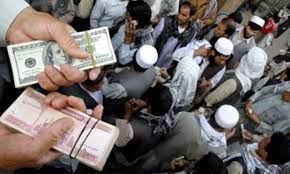The Director of UNDP’s Bureau for Asia and the Pacific has recently told reporters that 69 percent of Afghans are subsistence insecure and do not have ample basic resources. According to her, the Afghan economy, and especially regions affected by the devastating earthquakes in October last year, are still having a very harsh impact on the country. The Afghan economy has contracted by 27 percent and witnessed economic stagnation since the Taliban took over in August 2021. Unemployment has doubled and only 40 percent of the population has access to electricity. T
he country’s finances have collapsed and there are no major sources of economic activity except small and medium enterprises (SMEs) and farming. The UN Official voiced concern over the situation of women and girls, who face severe restrictions imposed by the Taliban regime on their dress code, employment, and unaccompanied movement within the country.
The South Asian nation has continuously been in the global headlines for one or the other perspective over the past multiple years. Afghanistan continues to suffer from a multifaceted crisis, as the international community grapples with how to approach international engagement with the Taliban rulers to help support the people of Afghanistan. The country is experiencing one of the world’s largest humanitarian crises, which is of great concern to the UN, the global community, and the regional states that have deep bonds with Afghanistan. Meanwhile, the Human rights situation, particularly for women and girls, and the terrorist threat are the key challenges for the United Nations and the global community which also have the potential to drag the Islamic Emirate into the post-9/11 situation once again. Because any major terrorist attack involving groups camped in Afghanistan can surely recast the past episode at any time in the future.
At the time, the Afghan economy faced grave challenges due to a lack of capital, skilled workforce, and technical cooperation dearly needed to revive the industry, diversify exports, and attain growth in the fields of education, healthcare, energy, Science and Technology, IT, Pharmaceutical industry, and others. However, the UNDP and several nongovernmental organizations are currently supporting Afghan women, farmers, and start-up businesses under their social protection programs providing cash and technical assistance to help improve the local economy and the livelihood of the masses. Yet, restrictions and hurdles from the global community and Afghan interim governments on NGOs’ work significantly undermine the pace of development and social work in the country.
In the first go, the interim Afghan government picked its political agenda after gaining control of the country instead of focusing on public and economic issues, political inclusiveness, foreign policy, regional trade, and making efforts for a dignified return of Afghan refugees abroad. Such behavior not only conversely affected the domestic economy and gave birth to humanitarian crises but also spoiled foreign relations and added to the financial, political, and security issues of the Islamic Emirate of Afghanistan (IEA).
The global community desires to see a prosperous, peaceful, and stable Afghanistan that must be free from terrorism and ruled by an inclusive government. The majority of the nations argue that the Taliban must adhere to international norms if they want to obtain international recognition and receive economic and development aid from the international community. The international community appears to favour maintaining pressure on the Taliban, particularly regarding their policies concerning terrorism, and human and women’s rights in Afghanistan. Amid such scenarios, the Afghan interim rulers seek extensive cooperation and trade with the regional states to gradually assimilate into the global arena without compromising their political agenda. Although, such dogma might assist the Afghan government in its survival yet it neither revives Afghanistan’s economy nor benefits common Afghans which they deserve uttermost.







